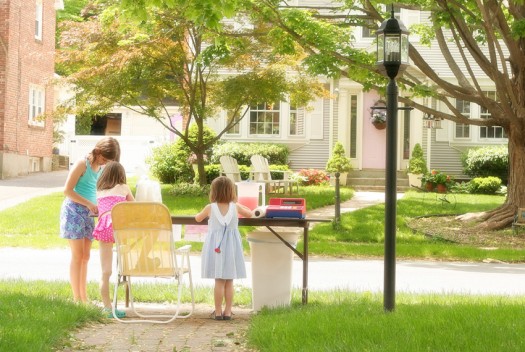A Placemaking Journal
You’ve Got Lemons: What now?
 A few months ago, I wrote about Leawood, Kansas’ efforts to shut down Spencer Collins’ Little Free Library because it constituted an illegal accessory structure. What made the story interesting is that, while certain advocates were using it as an example of government overreach, a closer look at the facts on the ground revealed that the town’s actions were precipitated by not one, but two neighbor complaints.
A few months ago, I wrote about Leawood, Kansas’ efforts to shut down Spencer Collins’ Little Free Library because it constituted an illegal accessory structure. What made the story interesting is that, while certain advocates were using it as an example of government overreach, a closer look at the facts on the ground revealed that the town’s actions were precipitated by not one, but two neighbor complaints.
Now here we go again.
This time, it’s a more timeless marker of community that’s emerged as the source of conflict. Specifically, it’s 12 year old T.J. Guerrero and his Dunedin, Florida lemonade stand.
T.J. is, by all appearances, a pretty savvy young entrepreneur. Toying with and measuring the performance of different hours and locations, he ultimately settled on 3-7pm and secured permission to operate in front of a neighbor’s house with desirable, intersection proximity — something that didn’t sit well with nearby resident Doug Wilkey. Wilkey calls the stand an “illegal business” and has contacted the city on at least four occasions in an effort to get it shut down.
Says the Tampa Bay Times:
Doug Wilkey contends that the Palm Harbor Middle School student’s year-round operation is an “illegal business” that causes excessive traffic, noise, trash, illegal parking and other problems that reduce his property values.
“Please help me regain my quiet home and neighborhood,” Wilkey, 61, wrote.

Destroying property values. Not. Photo credit: © Adwriter @ Flickr.
Live and let live die
This is what happens in a world where we don’t know each other. Or talk to each other. When your neighbor’s a stranger, there’s no need to make room for them in your life. There’s no need to feel any sense of responsibility for their wellbeing. Or for the healthy growth and development of their children.
In short, there’s no need to do anything except remain vigilant in a never-ending effort to protect your own interests — however exaggerated those interests (and your sense of victimization) might be. The behavior then becomes self-reinforcing, further isolating us from the people we may one day need the most.
This is no small deal, and it’s a drum I’ve been beating for some time now. Our willingness to engage each other in community — to admit that we don’t exist in a vacuum and that our happiness and prosperity are inextricably linked to our relationships with others — is not optional. It’s not a pick-and-choose prospect like granite countertops. It’s a matter of survival.
Attitudes ripple
The reason I’m revisiting this issue once again is because it’s at the heart of how communities are able to respond to new challenges, which is at the heart of whether or not they’re able to effectively thrive in the 21st century.
Just as suggestions of government overreach were somewhat misplaced in the Leawood story, I’m wondering if charges of lack of vision — and lack of action — frequently levied on leadership at the local level might in some cases be equally so. That is, how much of the problem lies with government, as we seem to suggest, and how much of it lies with government’s ultimate customer: Us?
Politicians, especially local ones, tend to require some level of political cover when it comes to taking on new ideas. They need constituents organized in support of shaking things up. But where is such support expected to materialize in a disconnected place?
How can anyone expect any politician to push for change when his or her electorate wants nothing more than the exact opposite — the promise that everything will remain exactly as it is in perpetuity?
It’s a choice
The boogeymen are varied. Sprawl, technology, and our 24-hour news cycle have all conspired — in different ways — to deliver us lemons. They’ve left us disconnected and fearful of those around us.
So long as we’re content to exist that way, we’ll remain consigned to ever diminishing prospects. But if we actively choose to change, we’ll discover newfound opportunities to turn those raw resources into lemonade.
If PlaceShakers is our soapbox, our Facebook page is where we step down, grab a drink and enjoy a little conversation. Looking for a heads-up on the latest community-building news and perspective from around the web? Click through and “Like” us and we’ll keep you in the loop.


